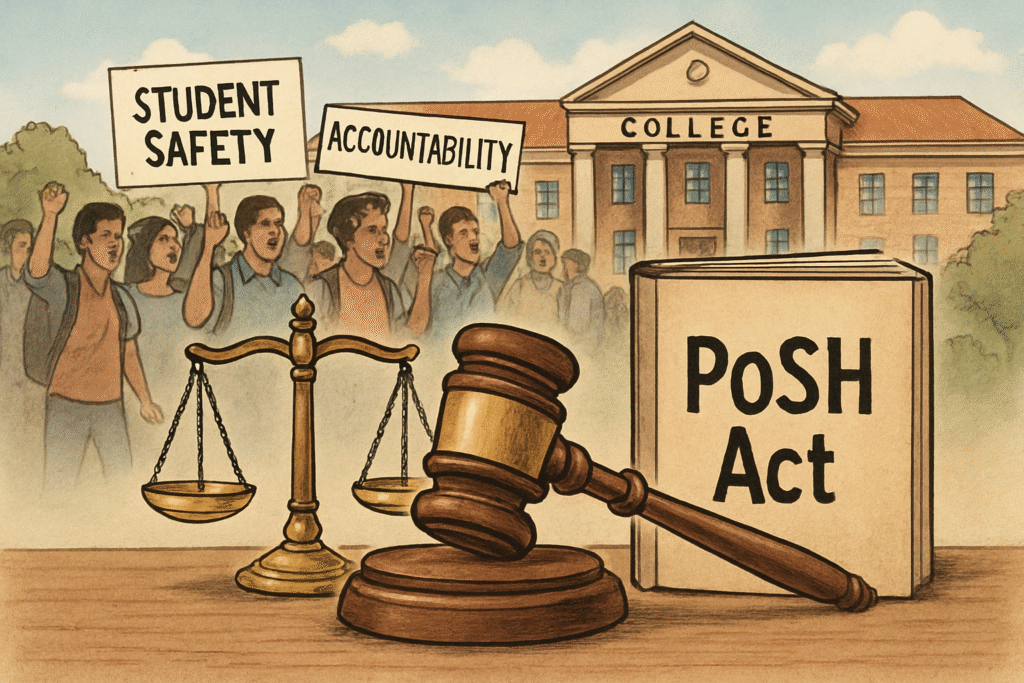Odisha High Court’s PoSH Order: A Wake-Up Call on Institutional Responsibility and Student Safety


Can we really talk about institutional safety if cries for help go unheard?
The Odisha High Court has now stepped in after a heart-wrenching tragedy that has shocked the nation: a young student, feeling unheard after lodging a sexual harassment complaint, set herself on fire in front of her college principal’s office on July 12, 2025. She lost her life two days later. This extreme act was not only a personal tragedy but also a scathing indictment of institutional failure.
The High Court’s order, dated July 22, 2025, in Shivsankar Mohanty vs. State of Odisha and Others (W.P.(C) No.20187 of 2025 – PIL), critically examines how grievance redressal mechanisms—particularly the Internal Committee (IC) under the PoSH Act—were executed, or rather failed, in this case. Let’s break down what actually happened, what the Court said, and what it means for institutional accountability and student protection going forward.
The Incident That Started It All
On July 12, a female student from a reputed Odisha college attempted self-immolation outside her Principal’s office. Despite medical intervention, she tragically died on July 14. Prior to this, she had filed a complaint of sexual harassment. Although the college’s Internal Committee had conducted an inquiry and submitted a report, the student reportedly felt that justice had not been done.
This incident triggered widespread student demonstrations, national outrage, and renewed scrutiny over how sexual harassment complaints are handled within our institutions.
The Petitioner’s Plea & The Government’s Response
Public-spirited citizen Shivsankar Mohanty filed a PIL in the High Court, demanding the formation of a neutral high-level Special Investigation Team (SIT) to probe the matter fairly. The emphasis was on a transparent and credible investigation that would leave no room for procedural lapses or cover-ups.The State, represented by Advocate General Mr. Pitambar Acharya, informed the Court that a special SIT had already been constituted. Importantly, it was being monitored by high-ranking officers—one of whom is a woman officer, reinforcing sensitivity in handling the investigation. Additionally, the Head of Department and the Principal involved were arrested and suspended post-FIR.
What the High Court Said: Human Dignity Must Come First
In one of the most piercing observations, the Court declared:
“Right to life enshrined under Article 21 includes the right to live with dignity. The students are not foreign to such fundamental rights.”
The bench, led by Chief Justice Harish Tandon and Justice Manash Ranjan Pathak, criticized the lack of urgency and institutional sensitivity in addressing the student’s complaint. It emphasized that once a grave allegation like sexual harassment is raised, the IC must act pragmatically and with empathy.
And here’s a line that hits home:
“It is really disturbing that the students, who got admission in a reputed college, would be subjected to any sexual harassment and alacrity is not shown in addressing it.”
The Court’s Stand on the SIT and Its Future Role
While the petitioner wanted a court-monitored SIT, the High Court stopped short of intervening directly—for now. Seeing that the State had already constituted a competent team and that investigation was underway, the Court chose not to create a parallel judicial SIT. However, it has reserved the right to monitor the investigation’s progress in the future, especially if it suspects misdirection or delay.
The Court has ordered that investigation updates be submitted under sealed cover by the State and preserved securely with its Registrar.
Internal Committees: Procedure vs. Substance
One of the sharp takeaways from this order is the implicit reminder that simply having an IC on paper isn’t enough. Under the PoSH Act, every institution with 10+ employees must form an IC with:
- A senior woman officer as Presiding Officer
- At least half of its members being women
- One external member from an NGO or group committed to women’s rights or a lawyer
The High Court’s critique? These committees must not merely exist, they must work—decisively, fairly, and sensitively. This tragic case reveals what happens when processes are mechanically followed but justice is not delivered.
Democracy, Protest & Boundaries: The Court’s Guidance
The Court didn’t shy away from addressing the wave of protests that followed the incident. Acknowledging that protest is a fundamental right, it reminded us:
“No one should be allowed to take the law in their own hand… every fundamental right is subject to reasonable restrictions.”
Protests are vital in any democracy, the Court said. But disruption of public servants’ work or endangerment of public order crosses the line. The State has been directed to maintain law and order while respecting protest rights, asking it to intervene only when the dissent turns unlawful.
What Happens Next?
- The State must submit an in-camera progress report on the investigation.
- Petitioner was directed to serve notice to other respondents.
- The case is listed for further hearing on August 12, 2025.
- Court will continue to oversee the fairness and progress of the investigation.
Final Thoughts: Time for Real Institutional Reform
Behind the High Court’s legal language lies an urgent call for action, introspection, and change. The PoSH Act is not a checkbox formality—it’s a framework for ensuring dignity, justice, and safety, especially in educational settings.
This case should serve as a jolt to institutions across India. Students have the same constitutional protections as any citizen. When these are violated—especially by institutional apathy—the consequences can be devastating.
Let this unfortunate incident be a turning point, not just a headline.